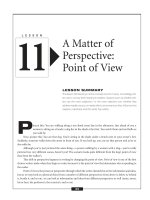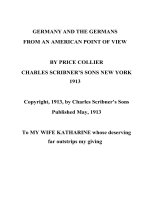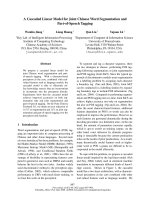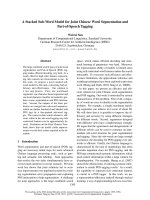Word Choice and Point of View
Bạn đang xem bản rút gọn của tài liệu. Xem và tải ngay bản đầy đủ của tài liệu tại đây (89.79 KB, 12 trang )
163
CHAPTER
16
W
ORD
C
HOICE
AND
P
OINT OF
V
IEW
Writers can convey
meaning in both direct
and indirect ways. One
way that they can
create meaning is
through their choice of
words. This chapter shows
you how even a small
change in word choice can
make a big difference
in meaning.
W
hat made Sherlock Holmes such a genius
at solving crimes? Was he just so much smarter than
everyone else? Was he somehow able to see into the
future or into the past? No, Sherlock Holmes didn’t have any magical
powers. He simply made the most of a power that all of us have: the
power of observation.
In Chapter 14, you began using your powers of observation to notice
details and descriptive language. You looked carefully at the practice
passages and noticed specific things about how they were written. This
helped you create a vivid picture of the people, places, and actions in the
text. By noticing the specific words writers use to describe, define,
READ BETTER
,
REMEMBER MORE
164
inform, and explain, you can also make important inferences about how
those writers feel about their subject.
MAKING INFERENCES
Inferences are conclusions based on reason, fact, or evidence. For example, if
you see that the sky is black and you hear thunder, you can infer (come to
the conclusion) that it’s going to rain. Good observations lead to good infer-
ences, which can help you determine meaning, just
as they helped Sherlock Holmes solve crimes.
To become a better reader, then, you need to
be more like Sherlock Holmes: you need to be
more observant. In the story “The Adventure of
the Blanched Soldier,” Sherlock Holmes tells a
client, “I see no more than you, but I have trained
myself to notice what I see.” You don’t have to be Sherlock Holmes to be a
good reader. You just have to train yourself to notice what you see.
MAKING OBSERVATIONS
ABOUT WORD CHOICE
The same idea can be conveyed in many different ways, and the words a
writer chooses to convey that idea can greatly affect its meaning.
For example, look at the three sentences below. They all convey essen-
tially the same information, but because of their choice of words, the
actual message of each sentence is quite different:
A. This is a risky situation.
B. This is a dangerous situation.
C. This is an explosive situation.
What do you notice about these three sentences? How are they different?
All three sentences show that the situation is uncertain and potentially
harmful. But notice the difference in the three words used to describe the
situation. One describes the situation as risky; another as dangerous;and
another as explosive. Based on the writers’ diction or word choice, which
writer seems to be the least worried about the situation? Which one
seems to be the most worried?
What’s an Inference?
An inference is a conclusion
based on reason, fact, or
evidence.
WORD CHOICE AND PONT OF VIEW
165
The writer of the first sentence appears to be the least worried, since
risky is less serious than either dangerous or explosive. Dangerous is seri-
ous, but explosive is probably the most serious. In an
explosive situation, things could erupt at any
moment and cause incredible destruction (even if
there aren’t any explosives involved). Thus, the
writer of the last sentence is the most worried about
the situation.
By using different words to characterize the same situation, each
writer actually communicates a unique message that reveals how he feels
about the situation.
DENOTATION AND CONNOTATION
There are many different ways to say dangerous. In fact, in the English
language, there are many different ways to say most things. Think for a
moment of all the different ways you can say “I’m tired”:
I’m exhausted. I’m worn out.
I’m sleepy. I’m beat.
I’m weary. I’m wiped out.
If you looked each of these words up in a dictionary, you’d see that
they all have similar definitions. But in reality, none of them mean exactly
the same thing. That’s because in addition to their dictionary definitions
(called denotation), words also have a level of meaning called connota-
tion. Connotation is the meaning that is implied or
suggested by the word. It is the social or emotional
impact that the word carries.
For example, tired, sleepy, and weary all mean the
same thing—the dictionary definition for tired is
often sleepy or weary, and vice versa. Yet these three
words have different connotations—different
degrees of meaning. Sleepy is the gentlest of the
three. If you’re sleepy, a nap would be nice, but
you’re not going to drop from exhaustion. Tired is
a word that requires more rest—say, a full night’s
sleep. And if you’re weary, you might need to stay
What’s Diction?
Diction refers to the spe-
cific words writers choose
to convey their message.
What’s Denotation?
Denotation is a word’s
dictionary definition.
What’s Connotation?
Connotation is a word’s
implied or suggested
meaning.
READ BETTER
,
REMEMBER MORE
166
in bed for the whole weekend. Weary also suggests an emotional tired-
ness that tired and sleepy do not.
P
RACTICE
1
Two sets of words with essentially the same meaning are listed below. If
you’re not familiar with these words, look them up in the dictionary.
Then, rank them according to their strength from weakest or least seri-
ous to the strongest or most powerful word.
1. a. dive
b. fall
c. plummet
d. tumble
2. a. deceive
b. fib
c. lie
Answer
Here are the words ranked from least serious to most serious:
1. d. tumble
b. fall
a. dive
c. plummet
2. b. fib
c. lie
a. deceive
HOW WORD CHOICE INFLUENCES MEANING
A writer’s word choice doesn’t just affect meaning: it creates it. Word
choice shows how the writer feels about her subject. It also shows some-
thing about the writer’s relationship to the reader. For example, notice
what the difference in word choice in the following sentences reveals.
Both sentences say the same thing (they provide the same information),
but they say it in two very different ways:
WORD CHOICE AND PONT OF VIEW
167
A. We need to get together to hammer out a new schedule.
B. We need to meet to arrange a new schedule.
Sentence A uses the words get together and hammer out while the
other, sentence B, uses the words meet and arrange. Now, what inference
or conclusion can you come to based on this difference in word choice?
a. Writer A has a more formal relationship with the reader than
Writer B.
b. Writer B has a more formal relationship with the reader than
Writer A.
c. Both writers have the same kind of relationship with the reader.
Answer b is correct. Even if you know nothing about these writers or
readers, you can safely infer from the diction of the two sentences that
Writer B has a more formal relationship with the reader than Writer A.
That’s because meet is a more formal word than the phrase get together,
and arrange is more formal than hammer out.
P
RACTICE
2
Read the following pairs of sentences carefully. On a separate sheet of
paper, write down your observations. What do you notice about the word
choice in the sentences? Then, answer the inference questions that follow.
Group A
A. Union representatives said that negotiations with management were
at a complete standstill.
B. Management said that talks with union representatives were stalled at
the moment.
Inference questions:
1
. Which party (the union or management) presents a more positive
view of the negotiations? How can you tell?
2
. Which sentence presents the more serious situation? How can you tell?
Group B
A. Rhonda has a very colorful way of speaking.
B. Rhonda has a very showy way of speaking.









